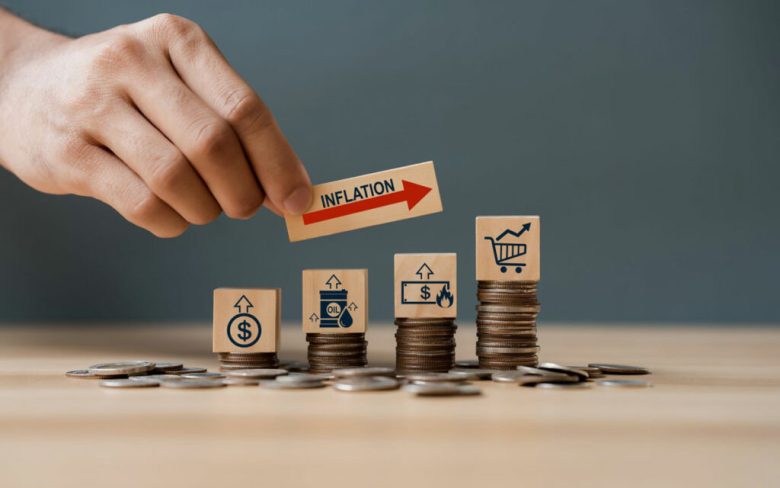Inflation creeps up on you like a stealthy robber that gradually reduces the purchasing power of your money. You might have noticed that the same groceries that you purchased a year ago now cost more. This is because inflation depreciates the worth of money over some time. If you do not take steps, your treasured savings can depreciate, which makes it important for you to take steps that secure your finances.
Investing your money greatly mitigates the effects of inflation on your wealth. Where, then, should you invest your money? In this guide, we will look at various investments with the most potential for beating inflation so that your monetary value continues to increase instead of decrease.
Inflation and Its Effects on Your Financial Resources:
When analyzing economic conditions, the phenomenon of inflation describes an increase in the prices of a specified basket of goods and services over some time. When inflation increases, the purchasing power of your money also decreases, which necessitates a higher amount of money to be spent to acquire the same items. While central banks try to limit inflation using certain monetary policies, inflation will always impact people, businesses, and the economy as a whole. If one has a savings account that pays a low interest rate, keeping money in the account will result in a loss of value. This makes it essential to understand inflation and how it works, as it helps in making informed decisions on investments.
The Importance of Investing to Combat Inflation:
Sitting money in a regular savings account can give a false sense of security, but finding refuge from inflation is unlikely with such an approach. The inflation rate surpasses the interest rate of most savings accounts, slowly eating away at the account’s true value. In contrast, investing provides one with the opportunity to earn significantly greater returns, thus surpassing inflation. Investing makes it possible to maintain assets that grow in value and, in turn, lead to an increase in the existing purchasing power.
Stock Market Investments:
Historically, the stock market is known for providing impressive returns in the long run and usually exceeding the rate of inflation. For example, protecting your money in stock markets for long years where you invest in blue-chip companies that have demonstrated steady growth is a good option. By purchasing company stocks, you become a shareholder, and you enjoy the benefits that arise when the company makes profits and develops. Moreover, stocks that pay dividends increase income, which makes them preferable to counter inflation.
Real Estate as an Inflation Hedge:
Inflationary periods make real estate one of the best asset classes. This is because property value as well as rental income of a property usually rises with inflation, which makes the investment gain value. Owning rental properties is a good way to generate passive income due to the appreciation of the property itself. Furthermore, those who want to invest in real estate without physically dealing with the properties can do so through real estate investment trusts (REITs).
Investment in Precious Metals:
They say inflation causes huge havoc, so gold and silver have always been looked upon as haven investments. Investors use metals as a way to shift money in the case of turmoil. Though not as proficient as stocks and real estate, metals hold on to their value when the economy depreciates and act as savings accounts.
Bonds and TIPS:
Government-issued bonds are said to provide higher returns during inflation and are fairly popular among investors. In comparison to others, TIPS are more efficient when it comes to inflation security. Inflation increases the value of bonds, thus allowing the purchaser to retain their buying power. However, corporate and municipal bonds are also good and tend to offer higher returns.
Cryptocoins and Inflation Shielding:
In recent years, much controversy has surrounded Bitcoin and other crypto assets. People and investors are looking at cryptocurrencies as a means to avoid inflation and are adopting them in large numbers. When looking at Bitcoin and crypto assets as a shield against inflation, it is good to keep in mind that unlike traditional currency, crypto is limited and much more volatile than controllable currency.
Commodities & Assets with Inflation Defenses:
A well-protected investment in commodities such as oil, natural gas, and farming stocks aids in safeguarding wealth against inflation. Often, inflation increases, which in turn makes commodity prices soar, offering their holders additional wealth through growth in portfolio value. The ETFs that track the prices of commodities are an easy way to gain exposure to such assets that resist inflation financially.
How To Build An All-Rounded Effective Portfolio:
The best way to control the chances of investing risk is to build a diversified portfolio. If an investor spends all their funds on one type of asset, for instance, stocks, there are significant chances of making losses, but if they diversify their investment in various stocks, real estate, bonds, and even commodities, the chances of making profits are higher. This approach of investing offers remained wealth, which is secure because even if one asset performs poorly, there are numerous others to support the portfolio.
High Yield Savings & CDs:
Savings accounts that yield high interest and CDs are types of savings accounts that offer higher yields compared to regular savings accounts. Even when they do not provide cover for inflation, they are a great option for conservative investors looking to protect capital and gain a higher guaranteed return.
Function of Passive Income in Providing Protection Against Inflation:
The purchase of dividend stocks, real estate, and peer-to-peer lending can create passive income, which in turn can help in alleviating inflation. A continuous flow of passive income allows wealth to grow without needing constant attention. This enables maintenance of financial security.
Investment Strategies in the Context of Inflation:
Sustained holdings of stocks, real estate, and retirement accounts tend to provide better strategies for battling inflation in the long term. While short-term investments like money market funds allow easy access to cash, they do not beat inflation. Having both strategies works best for long-term growth while achieving financial freedom.
Protecting from Inflation: Financial Planning Approaches
Regularly reviewing and updating one’s portfolio, along with keeping up to date with weekly economic changes, is part of good financial management. Keeping an eye on inflation enables prompt decision-making regarding protective measures for the funds. Financial advisors also prove helpful by providing professional guidance suited to one’s financial goals.
Conclusion:
Although inflation is an economic constant, it does not have to diminish your wealth. With the right investment strategies, you can avoid losing wealth and increase your wealth. It does not matter if you go for stocks, real estate, commodities, or even cryptocurrency; the most important thing is to act proactively and have a diversified assortment. Having investments that resist inflation helps protect wealth and ensure it does remain intact for the future. Taking proactive measures today helps protect your wealth for many forthcoming years.
FAQs:
1. What is the best investment to beat inflation?
Among the strongest assets to counter inflation are stocks, real estate, and TIPS. Spreading investments around to different assets optimizes gains while minimizing losses.
2. Is gold a good investment against inflation?
Yes. For a long time, gold has remained a trustworthy asset to offset inflation as it outweighs any depreciating value associated with currencies.
3. Is cryptocurrency considered a hedge against inflation?
A selected group of investors considers Bitcoin and other currencies as digital gold due to their limited availability; however, their unpredictable nature places them in the high-risk category.
4. In what ways does real estate aid in inflationary periods?
The value of real estate increases over time, and rental cash flow also grows with inflation, making it an excellent asset for preserving wealth.
5. Should I continue to put money in a savings account during inflation?
Storing money in a traditional savings account could lead to erosion of value owing to meager interest rates. Better protection comes from high-yield savings accounts and investments.




